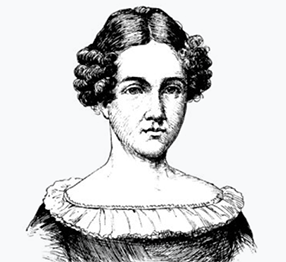The Smile of Innocence
There is a smile of bitter scorn,
Which curls the lip, which lights the eye;
There is a smile in beauty’s morn,
Just rising o’er the midnight sky.
There is a smile of youthful joy,
When Hope’s bright star’s the transient guest;
There is a smile of placid age,
Like sunset on the billow’s breast.
There is a smile, the maniac’s smile,
Which lights the void which reason leaves,
And, like the sunshine through a cloud,
Throws shadows o’er the song she weaves.
There is a smile of love, of hope,
Which shines a meteor through life’s gloom;
And there’s a smile, Religion’s smile,
Which lights the weary to the tomb.
There is a smile, an angel’s smile,
That sainted souls behind them leave;
There is a smile that shines through toil,
And warms the bosom though in grief;
And there’s a smile on Nature’s face,
When Evening spreads her shades around;
A pensive smile when twinkling stars
Are glimmering through the vast profound.
But there’s a smile, ’tis sweeter still,
’Tis one far dearer to my soul;
It is a smile which angels might
Upon their brightest list enroll.
It is the smile of innocence,
Of sleeping infancy’s light dream;
Like lightning on a summer’s eve,
It sheds a soft and pensive gleam.
It dances round the dimpled cheek,
And tells of happiness within;
It smiles what it can never speak,—
A human heart devoid of sin.
This poem is in the public domain. Published in Poem-a-Day on January 26, 2025, by the Academy of American Poets.
“The Smile of Innocence” appears in Poems by Lucretia Maria Davidson (Hurd and Houghton, 1871), edited by M. Oliver Davidson. In the introduction, American critic Barry Gray wrote, “As a poet, Lucretia Davidson possessed a depth of thought, a delicacy of expression, a tenderness of sentiment, and an appreciation of melody rarely to be met. She had a fine fancy, a quick imagination, a quiet and unobtrusive humor, and underlying all a foundation of thorough and unwavering thoughtfulness. Her writings are marked by grace, ease, and refinement […]. Her heart as well as her mind, is apparent in her compositions; and soul, as well as intellect, permeates and gives character to her productions. But the genius of Lucretia Davidson has been acknowledged by writers greatly distinguished in literature, not only in this country but in England. Robert Southey, one of the most brilliant critics and accomplished poets, wrote in praise of her productions years ago, in the London Quarterly Review. With a fullness of expression, creditable to his heart as well as to his understanding, he said: ‘In these poems there is enough of originality, enough of aspiration, enough of conscious energy, enough of growing power, to warrant any expectations, however sanguine, which the patrons and the friends and parents of the deceased could have formed.’”

